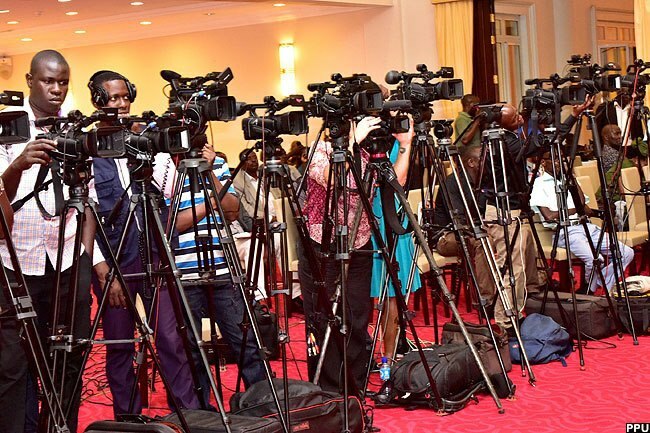Police, UCC top violators of media freedom - report
The report shows that on several occasions the Police blocked journalists from accessing news scenes of crimes and sources, accounting for 27% of all the incidents.
MEDIA|FREEDOM
The Uganda Police Force and Uganda Communications Commission (UCC) have been named as top violators of press freedom.
According to the 11th Press Freedom Index Report-2019 released by the Human Rights Network for Journalist- Uganda (HRNJ-Uganda), many journalists have suffered violations from the Police and UCC while on duty.
The report, titled Watch Dog; Braving Hostility To Serve indicates that the Police as the biggest violator of media rights contributing 60% of all the violations while UCC, the government's media regulator, came second with 22% of the violations.
They were followed by the Uganda Peoples Defence Forces (UPDF) and mobs against journalists at 3.6% each.
The report indicates a slight increase from 163 in 2018 to 165 cases in 2019.The report was supported by USAID, Freedom House and Open Society Foundation.
Speaking at the release of the report at the Grand Imperial Hotel in Kampala yesterday, HRNJ-U executive director, Robert Ssempala raised concern about the increased violation and abuse of journalists.
He said such violations and abuses continue to affect the independence of journalists as they work under hostile environments.

NATURE OF VIOLATIONS, PERPETRATORS
The report shows that on several occasions the Police blocked journalists from accessing news scenes of crimes and sources, accounting for 27% of all the incidents.
The suspension of editors and producers accounted for 23%, while arrests and assaults accounted for 22% and 16%, respectively.
The report highlights the arrest of the Next Media Services journalists and BBC crew, who were jointly investigating the theft and smuggling of government drugs, which it points out as an attack on investigative journalism.
"That is why today, we have few investigative stories published," he added.
The report also shows that the number of cases involving Resident District Commissioners (RDCs) meddling in media freedom increased from two in 2018 to six in 2019.
"Some RDCs stormed and raided radio stations, switched them off and removed opposition politicians, who were participating in talk shows from the studios," the report says.
The report shows that TV journalists suffered more violations at 46% followed by radio (31%), online (16%) and print at 7%.
Ssempala said 30 cases of violations and buses against journalists were also recorded during the enforcement of the COVID-19 lockdown. He said the violations were committed by Local Defence Unit personnel.
RECOMMENDATIONS
The report recommends development of standard operating procedures (SOPs) by the Police to guide their officers when dealing with journalists during field operations.
"We are calling on the Police leadership to consider introducing and incorporating media law in their training schools, especially for their mid-level officers," the HRNJ-U board chairperson, Juilus Esegu, said.
He added that the Police and other security agencies should demand individual accountability of officers implicated in the violation of media rights as provided in the Human Rights (Enforcement) Act 2016.
They called for the streamlining of the regulatory mandates of UCC and Media Council with respect to the media. The creation of a tribunal to hear disputes in the sector as is provided for in Section (60) of the Uganda Communications Act, 2013 (as amended).
Esegu said all stakeholders also need to undertake a comprehensive review of the working conditions of journalists, including their welfare, remuneration and social security benefits.
"Media houses that cannot pay their journalists should have their licenses revoked. Many journalists are compromised because of the poor working conditions," he said.
POLICE
Cornelius Beyanga, from the Police Directorate of Human Rights and Legal Services, said violations are done by individual officers and many have been penalised through the Police courts.
"We are sensitising Police officers and the Inspector General of Police has issued circulars on the same," he said.
Beyanga called on journalists to form a strong umbrella body to speak with the same voice to easily deal with their problems.
He said where a journalist feels unsatisfied in the way the Police has handled their case, they can go to the criminal court.
While launching the report, the chief of party for Freedom House in Uganda, Don Rukare, said they are working to ensure freedom of the press is amplified. He, however, called on journalists to practice responsible journalism.